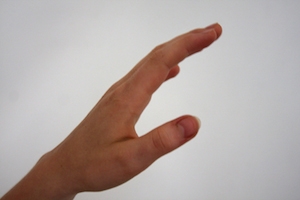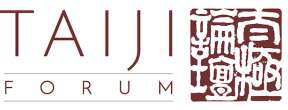
My name is Simone and I was diagnosed with CUP-syndrome in 2012 and with breast cancer with a genetic mutation in 2015.
In convalescent care, a made my first contact with Qigong and I realised that it is very good for me. For in Qigong one learns to concentrate on one’s body and to be mindful, one begins to occupy oneself with one’s body again and to listen inwardly, what it wants to say to me.
In convalescent care, I have been given a prescription for rehab sports at home and later I got another prescription for rehab sports due to my own initiative. Being able to choose the kind of activity I prefer, I always choose to do Qigong, because it is not only wellness for my body but also for my soul.
Because I have learned how to be mindful concerning my body, I am able to cope better with fatigue, which I often experience.
Furthermore, I took part in the Taiji Forum meeting in 2017. There, further ways of Qigong were opened up for me and other exercises were deepened.
Speaking from my personal experience, I can recommend Qigong for cancer patients. In the meantime, there is also a development of special exercises for cancer patients, even though all other exercises are also very well suited.
Author: Simone Krüger
Images: Taiji Forum
Qigong Healing Series
Qigong and healing Qigong, working with the Qi (life energy), is commonly known as furthering overall health. – However, its underlying idea of Yangsheng – nurturing of life force or short: care for life – does not automatically distinguish it from other systems of caring for health, movement methods or other forms of (therapeutic) breathing techniques…
Qigong Scientific Studies Scientific studies about the efficiency of Qigong face a double challenge. For one thing, the cultural background of Qigong leads to a specific view of the human condition, which in part conflicts with the Western view on the human body, which lies at the foundation of “modern” medical research. An additional problem is that scientific standard methods of medical research, which determine today’s Qigong research, are to some extent unsuitable to capture typical aspects of Qigong, due to the Western image of medicine and its rootedness in a distinct research tradition.
Qigong studies – background and significance This part explains how Qigong studies refer to their subject Qigong (What is Qigong?). The most common kind of study is explained and its background and significance is explored…
Qigong and healing part 4 – Qigong research – meta-studies Apart from single test series (randomized controlled trials) Qigong research mainly consists of meta-studies and reviews. This text deals with their function and their typical findings. Contrary to what its name may indicate, meta-studies are not per se “better” studies than trial studies. The method behind meta-studies is to search data bases and …
Qigong and healing part 5 – The landscape of Qigong research The strictly practice-related approach of this kind of Wellness-Qigong research eclipses the theoretical problems; the contradictions mentioned above seem to be solved. – Regrettably, the opposite is true: The evidence produced in such a “practice-led” research cover the scientific dilemma, but do not contribute to its solution. Actually, with this research approach it does not matter at all, if one researches about Qigong or other methods (Yoga, Pilates, Zumba,…). The decision about the focus of the studies is neither related to a certain cognitive interest attached to the health method in question nor to the experimental design as such, but it is solely a question of taste or fashion…
Sources of medical research about Qigong and Healing The difficulty for all people interested in Qigong research is that with Qigong being a exercise system aimed at overall health the articles are scattered over different research areas. The question thus is: Where to start? Research conducted at university institutes is regularly published in respective scientific or professional journals, which differ in scope and importance from country to country…
Assessment of Publications on Qigong and Healing Some key points for the assessment of publications on Qigong and healing: What are possible clues for the assessment of a publication? Is a scientist a Qigong expert? Is a Qigong expert who really gets into the details of the art – i.e. „researches“ as part of his work – a scientist?
Overview Qigong Studies As pointed out above, until now there is NOT any conclusive evidence whatsoever, that Qigong – irrespective of the sets and methods trained – has any tendency to heal certain diseases or illnesses. It is also NOT scientifically proven that any health effects of Qigong are in some kind deeper, more powerful or in some other way more effective than any other movement related activity as e.g. conventional health gymnastics or other Western or Eastern sports – modern or traditional…
Qigong & Cancer Healing I have been a practitioner and teacher of Qigong (Yangsheng) for many years. In the scheme of things I am reasonably well qualified and have a great deal of experience. For the past few years I have been teaching Qigong professionally to cancer patients at a Maggie’s Cancer Care Centre. I can tell you categorically that I do not teach Qigong to cancer patients in order to cure their cancer. Claims of curing cancer with Qigong are not only bold but dangerous and irresponsible. They prey on the vulnerable and desperate. Even the more well known ‘cancer curing’ Qigong methods like the Gui Lin Walking Qigong has no real scientific basis for claim…
Qigong Influence on own Cancer I was initially diagnosed with prostate cancer with metastasis in the spine 4 years ago in early 2014. At this point, I was completely unaware of the existence of qigong. The following year was spent in and out of hospital. Progress of the cancer was duly halted thanks to medication and numerous radiotherapy sessions. However, some damage to the spine cannot be reversed by medical treatment. I truly believe that qigong has saved my life so far…
GAINING POST CHEMO STRENGTH THROUGH QI GONG On June 30th 2012 I was diagnosed with a squamous cell carcinoma on the oesophagus – considered at the time to be terminal. Now in my third year as a student in this class I can report that I could not have made a better decision…
